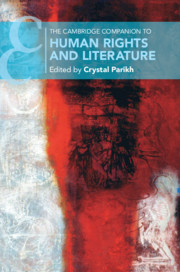Book contents
- The Cambridge Companion to Human Rights and Literature
- The Cambridge Companion to Human Rights and Literature
- Copyright page
- Epigraph
- Contents
- Notes on Contributors
- Chronology of Major Works and Events, 1215–2018
- Introduction
- Part I Genealogies and Contexts
- 1 Recounting History, Locating Precursors for Human Rights
- 2 Humanitarianism’s Way in the World
- 3 Literature, Human Rights, and the Cold War
- 4 Human Rights in the Vernacular
- Part II Fashioning Methods
- Part III Generic Representations
- Part IV Writing Human Rights
- Select Bibliography
- Index
- Cambridge Companions To …
2 - Humanitarianism’s Way in the World
On Missionary and Emergency Imaginaries
from Part I - Genealogies and Contexts
Published online by Cambridge University Press: 24 June 2019
- The Cambridge Companion to Human Rights and Literature
- The Cambridge Companion to Human Rights and Literature
- Copyright page
- Epigraph
- Contents
- Notes on Contributors
- Chronology of Major Works and Events, 1215–2018
- Introduction
- Part I Genealogies and Contexts
- 1 Recounting History, Locating Precursors for Human Rights
- 2 Humanitarianism’s Way in the World
- 3 Literature, Human Rights, and the Cold War
- 4 Human Rights in the Vernacular
- Part II Fashioning Methods
- Part III Generic Representations
- Part IV Writing Human Rights
- Select Bibliography
- Index
- Cambridge Companions To …
Summary
This chapter seeks to recover forgotten ideological and structural causes behind humanitarianism, ones which have been eclipsed by its association which the fraught aid industry, the white saviour syndrome, and the general ineffectiveness of sentimentality when it comes to humanitarian action. Distinguishing between the worlds of “missionary” and “emergency” humanitarian expression (with histories dating from the eighteenth and nineteenth centuries, originating separately in discourses of reform and abolition, and that of crises such as natural disaster and war), the authors show how these two strands present widely different narratives and concepts of suffering, innocence, temporality, witnessing, evidence, and so on.
- Type
- Chapter
- Information
- The Cambridge Companion to Human Rights and Literature , pp. 27 - 41Publisher: Cambridge University PressPrint publication year: 2019

